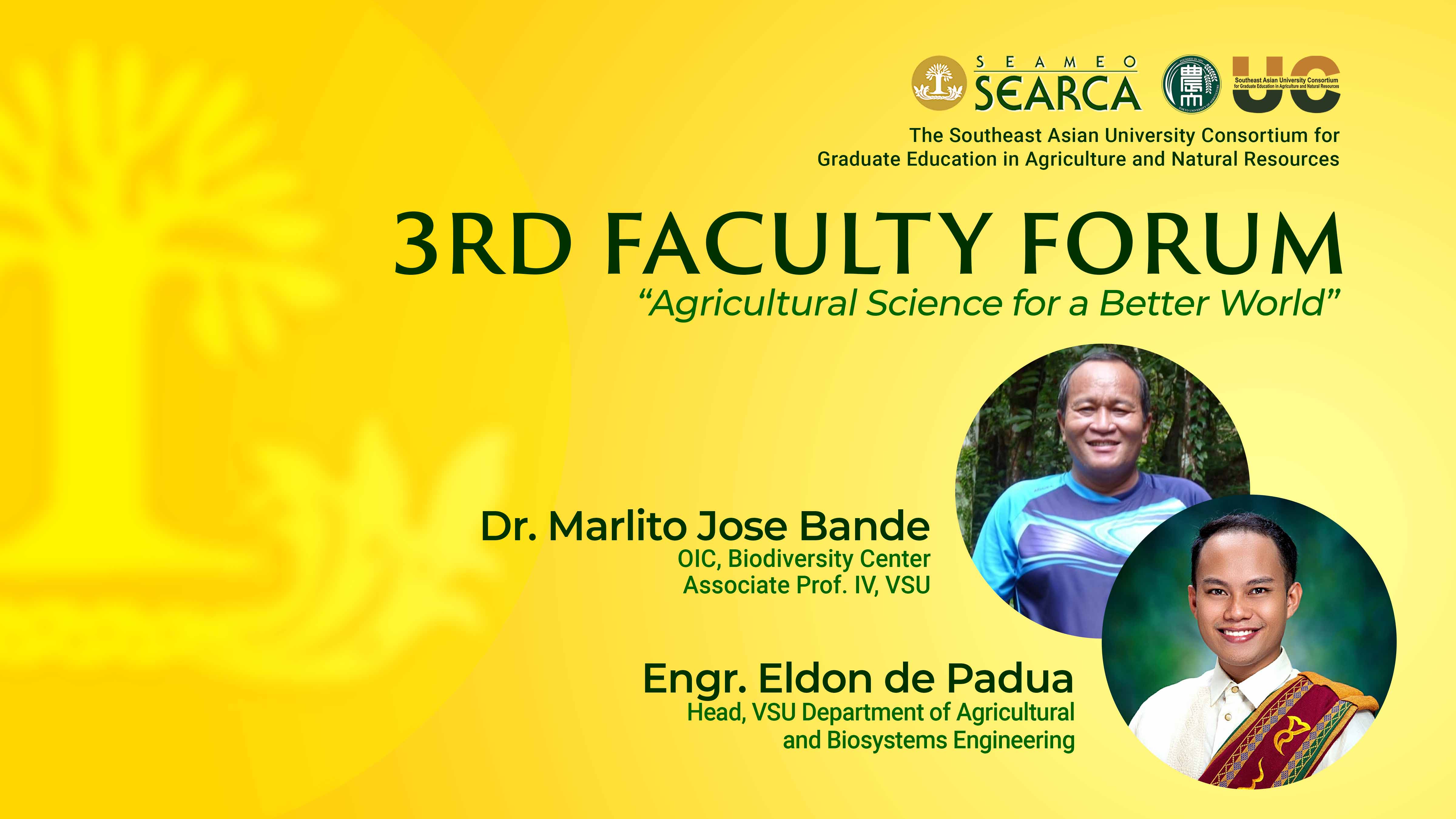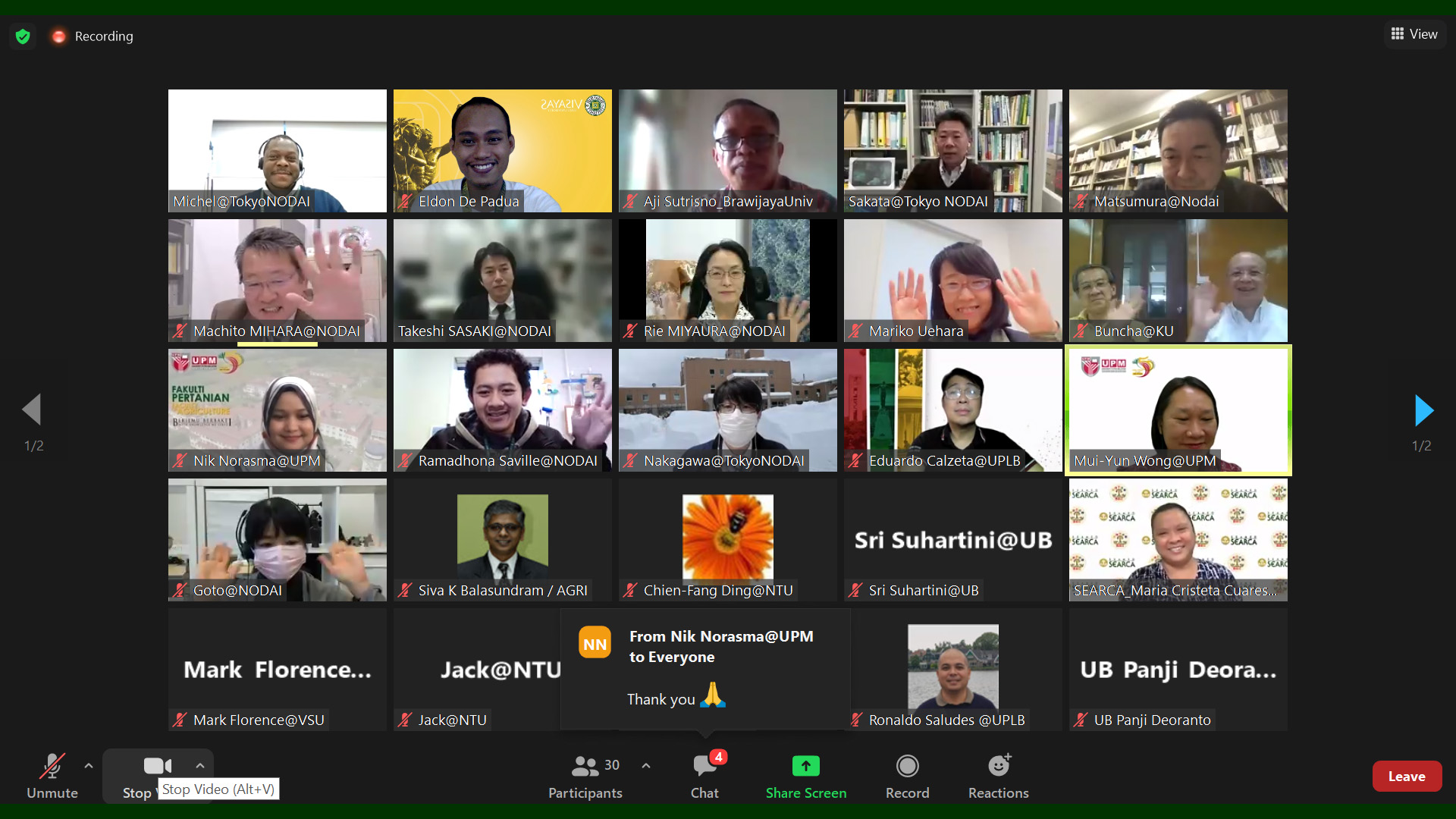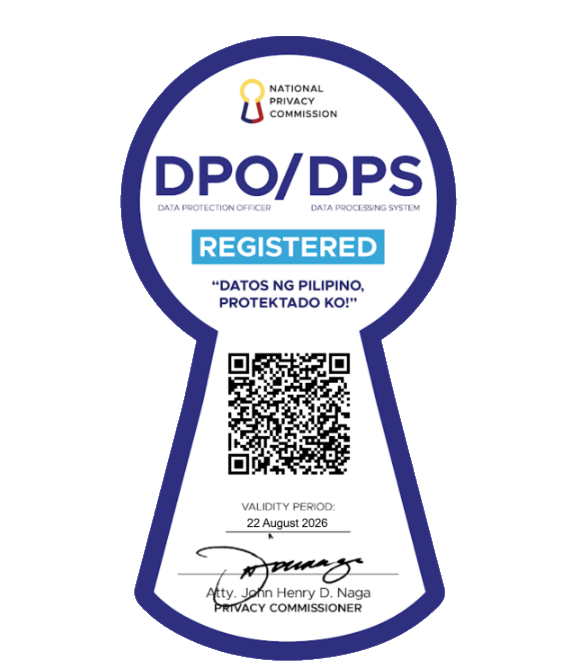VSU joins 3rd Faculty Forum of premier Southeast Asian University Consortium
- Details
- Written by Neil Bryan B. Fulache
-
Published: 08 March 2022

The Southeast Asian University Consortium for Graduate Education in Agriculture and Natural Resources, more popularly called as the University Consortium (UC), conducted its 3rd Faculty Forum virtually at the opening of this year.
And VSU took part in this international gathering with two of our faculty members serving as distinguished speakers.
Initiated by the Southeast Asian Regional Center for Graduate Study and Research in Agriculture (SEARCA) being the lead institution of UC, the Faculty Forum is an annual event that aims to provide an opportunity for faculty members from member universities to develop camaraderie, encourage transdisciplinary studies, and promote greater integration of research through strategic partnerships for collaboration.
A total of 10 of UC’s 13 member-universities participated in the third edition of the Faculty Forum and this is VSU’s pioneering attendance to such an event after being admitted as an official member of this prestigious Southeast Asian organization in November 2020.
With the theme “Agricultural Science for a Better World,” this two-day virtual assembly was hosted by the Tokyo University of Agriculture (Tokyo NODAI) in Japan.
Divided into 4 sessions, various speakers from participating universities tackled different agri-science topics.
Recognizing this as an opportunity for knowledge-exchange, VSU’s International Affairs Office (IAO) nominated reputable VSU faculty members to represent the university with Dr. Marlito Jose Bande and Engr. Eldon De Padua as our official representatives.

Dr. Bande, a Professor of Institute of Tropical Ecology and Environmental Management (ITEEM), took part in the first thematic session that discussed agroecology, food production and sovereignty in Asia.
In this session, Dr. Bande presented his research entitled “Challenging the change: connecting knowledge-based and community-driven approaches in the development of conservation agriculture in disaster-prone upland communities vulnerable to climate change in Cabucgayan, Biliran, Philippines.”
This study discussed how mature smart-agriculture technologies generated in VSU were helping disaster-prone areas in a remote town in Biliran province. In collaboration with the local government and other agencies, their community-driven project has successfully developed a total of 59.2 hectares of conservation agriculture farms that employed over 518 farmers.
Meanwhile, Engr. De Padua, the current Head of the Department of Agricultural and Biosystems Engineering (DABE) was assigned in the thematic session on land and water management for sustainable rural development in Asia.
In this session, Engr. De Padua tackled his research on “Comparative performance of fall cone and percussion methods in determining the liquid limit of clayey soils in the Philippines,” which is a self-funded preliminary study that he is presently pursuing.
Based on the World Risk Index of 2021, as the Philippines sits right on top of the typhoon belt, it ranks 8th among tropical countries in the world that is severely at risk of landslides. A good indicator of which is the liquid limit of clay soils in the country, and how it behaves in increased saturation of water.
Liquid limit pertains to the water content of soil where it behaves like a viscous fluid, an important factor to consider in landslide prevention and precaution.
Without a standard means of determining the liquid limit of the country’s clayey-type soils, Engr. De Padua and his team attempted to analyze this research problem, proving that the fall cone method shows much more reliable results than that of the percussion method.
Having been able to present his ongoing study to an international audience, Engr. De Padua expressed his thanks to the VSU-IAO and emphasized the benefits of VSU’s pursuit for internationalization.
"I believe that exchanges of knowledge during international forums would give VSU faculty and researchers a broader stance in their respective research endeavors. It could also develop empathy with the other nations in addressing both local and global concerns, thereby cementing a good relationship with international institutions and possible nascence of international collaboration," the DABE Head said.
Meanwhile other thematic sessions that were discussed in the Faculty Forum include the application of biotechnology for sustainable agriculture in Asia, and the application of unmanned aerial vehicles (UAV) including satellite sensor and low-power wide-area (LPWA) networking for rural development in Asia.
Universities that were present in the virtual event were coming from 6 countries across Asia, where Philippine delegation included VSU, the University of the Philippines Los Baños (UPLB), and the Central Luzon State University (CLSU).


